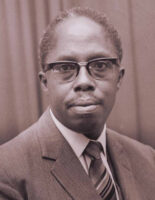
Julius Gikonyo Kiano, the first Kenyan to obtain a PhD degree, was a pioneer scholar and freedom hero. He was born in 1926 at Githiga in Kangema, Murang’a District. He went to Weithaga Primary and Kagumo Intermediate schools before joining Alliance High School. He subsequently did two post-secondary education programmes at Makerere in Uganda and eventually proceeded for Antioch College in Ohio, US, in 1948 and graduated with a degree in economics in 1952. At Antioch, Kiano developed an interest in the cooperatives, a movement that would revolutionise agriculture and other sectors of the economy after independence.
Before leaving Kenya for the US, Kiano was aware of the political situation (colonialism) and the need for educated and non-educated Kenyans to join hands in the liberation struggle. Kiano, who stayed for eight years in the US studying economics and political science, got a university fellowship from Stanford University to study political science in 1953. The desire to free Kenya from the yoke of colonialism had been planted in him by African soldiers returning home from the Second World War in 1945 when Kiano was in high school.
Kiano, who later became independent Kenya’s first Minister for Commerce and Industry, went to California University’s Institute of International Studies, Berkeley, for a PhD in comparative studies on colonial liberation in Asia and Africa. At Berkeley, he worked under professors and other academics, knowledgeable in China, Japan and other south-east Asian countries that had shown interest in Africa.
In a 1996 interview, Kiano recalled: “My going to Berkeley to study nationalism was, therefore, not theoretical at all. I could see what had happened in India, what was happening in Indonesia, what was happening in Dien Bien Phu and so I knew things would also be happening in Africa. “In 1951, Dr Kwame Nkrumah became the leader of government business in the Gold Coast (Ghana) and it later became the first African country to be independent from British rule in 1957, a year after I got my PhD. I was trying to relate my studies as much as I could with what was happening in Africa and what was likely to go on in the continent.”

In September, 1956, after eight years of study in the US, Kiano, came back to Kenya and got a job at the only post-secondary college in the country, the Royal Technical College (now the University of Nairobi) as its first African lecturer. He taught economics and constitutional law. He later abandoned the classroom for politics and was elected to the Legislative Council in 1958 to represent Central Province South. Kiano and other leaders, including Tom Mboya, knew freedom would not mean much unless the country had enough personnel to take over from the departing colonial technocrats.
They, therefore, wrote to their friends in American universities, colleges, the political leadership and the trade union movement, seeking scholarships for young Kenyans to study in America. The response from American universities was overwhelming. This resulted in the ‘Great Airlift’ through which hundreds of Kenyan students went to the US to study.
